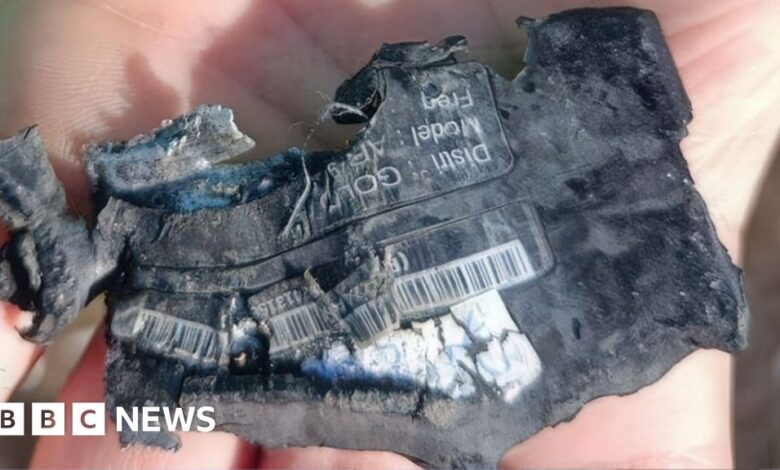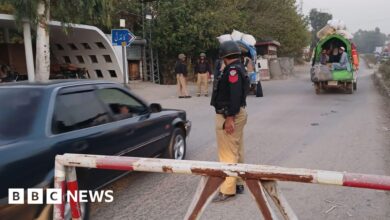How did they explode and who was responsible?

At least 12 people, including two children, were killed and thousands more injured, many seriously, after pagers used by the militant group Hezbollah to communicate exploded across the country on Tuesday.
It is not yet clear how the highly sophisticated attack took place, although Hezbollah has blamed its rival Israel. Israeli officials have so far declined to comment.
Analysis of fragments from the pagers suggests they were made by Taiwanese company Gold Apollo, but the CEO has denied this, saying they were manufactured under licence by a company in Hungary. Calls to the company by the BBC went unanswered.
On Wednesday afternoon, there were reports of more walkie-talkie-related explosions in south Beirut.
Here’s what we know so far.
How did Tuesday’s attack unfold?
The explosions began in the Lebanese capital Beirut and several other parts of the country at around 15:45 local time (13:45 BST) on Tuesday.
Witnesses said they saw smoke coming from people’s pockets, before hearing small explosions that sounded like fireworks and gunshots.
In one clip, surveillance camera footage shows an explosion in a man’s pocket as he stands at the cashier counter of a store.
Citing US officials, the New York Times said the pagers received messages that appeared to come from Hezbollah leadership before the explosions. Instead, the messages appeared to have triggered the devices, the news agency reported.
Reuters news agency reported that the explosions continued for about an hour after the first explosion.
Soon after, dozens of people began arriving at hospitals across Lebanon, witnesses described chaotic scenes.
Analysts said the most likely explanation was a supply chain attack that caused the pagers to be tampered with during production or shipping.
Reuters quoted a Lebanese security source as saying that a small amount of explosives was placed inside the devices several months ago.
Speaking to the BBC, a former British Army ammunition expert, who asked to remain anonymous, speculated that the devices could have been activated by a remote signal.
What do we know about pagers?
A Hezbollah official told the AP that the pagers were a new brand that the group had never used before. A Lebanese security official told Reuters that about 5,000 pagers were brought into the country about five months ago.
Markings found on the debris of the exploded pager indicate a pager model called the Rugged Pager AR-924. But Taiwanese manufacturer Gold Apollo has denied any involvement in the explosion. When the BBC visited Gold Apollo on Wednesday, local police had surrounded the company’s offices, examining documents and questioning staff.
The founder, Hsu Ching-Kuang, said his company had signed a deal with a Hungarian-based company – BAC – to manufacture the devices and use his company name. He added that the transfer of money from them was “very strange”, without elaborating.
BBC Verify has accessed BAC’s corporate records, which show the company was first incorporated in 2022. The company’s registered address is in an unnamed building on the outskirts of Budapest, and the BBC called the company’s offices several times on Wednesday but received no response.
However, CEO Cristiana Bársony-Arcidiacono told NBC she had no knowledge of the explosion. “I don’t make pagers. I’m just a middleman. I think you misunderstood,” she said.
What caused the attack?
Unnamed US and Israeli officials told Axios that detonating all the pagers at once was originally planned as a prelude to a “full-scale” attack on Hezbollah. But in recent days, Israel grew concerned that Hezbollah knew about the plan — so it launched it early.
Israeli officials have not commented on the allegations, but most analysts agree that it appears they were behind the attack.
Professor Simon Mabon, chair of international relations at Lancaster University, told the BBC: “We know that Israel has a history of using technology to track targets” – but he called the scale of this attack “unprecedented”.
Lina Khatib, from the UK-based Chatham House, said the attack showed Israel had “deeply penetrated” Hezbollah’s “communications network”.
Prime Minister Najib Mikati said the blast was a “serious violation of Lebanon’s sovereignty and criminal by every standard”.
In a statement accusing Israel of being behind the attacks, Hezbollah said it held the country “fully responsible for this criminal act of aggression, which also targeted civilians”.
Why does Hezbollah use pagers?
Hezbollah has relied heavily on pagers as a low-tech means of communication to try to evade Israeli location tracking. Pagers are wireless telecommunications devices that can receive and display alphanumeric or voice messages.
They are much harder to track than mobile phones, which were long abandoned because they were too vulnerable to hacking, as in the 1996 Israeli assassination of Hamas bomb-maker Yahya Ayyash, when his phone exploded in his hand.
In February, Hassan Nasrallah instructed Hezbollah fighters to throw away their phones, saying they had been infiltrated by Israeli intelligence. He told his forces to smash, bury, or lock their phones in an iron box.
Experts now say the directive, issued in a live televised speech, may have given Israeli intelligence officers advance warning that the group would seek a new – possibly lower-tech – method of communication.
What is known about the victims?
A source close to Hezbollah told AFP that two of those killed were the sons of two Hezbollah MPs. They also said the daughter of a Hezbollah member was killed.
Among those injured was Iran’s ambassador to Lebanon, Mojtaba Amani. Iranian media reports said his injuries were not serious.
Hezbollah leader Hassan Nasrallah was not injured in the explosion, Reuters reported.
Lebanon’s Public Health Minister Firass Abiad said the majority of injuries were to the hands and face.
Speaking to the BBC’s Newshour programme, he said: “Most of the injuries appear to be to the face and particularly the eyes and also the hands, including some amputations, possibly of hands or fingers, and some injuries to the hips.”
“Most of the people who come to the emergency room are wearing civilian clothes, so it is difficult to distinguish whether they belong to an organization like Hezbollah or something else,” he added.
“But we see among them elderly people or very young people, like the child who unfortunately died… and there are some who are health workers,” the minister said.
Outside Lebanon, 14 people were injured in similar explosions in neighbouring Syria, according to the UK-based Syrian Observatory for Human Rights.
Will the Hezbollah-Israel conflict escalate?
Hezbollah is allied with Israel’s arch-enemy in the region, Iran. The group is part of Tehran’s Axis of Resistance and has been engaged in a low-level war with Israel for months, regularly exchanging rocket and missile fire across Israel’s northern border. Entire communities have been displaced from both sides.
The explosions came just hours after Israel’s security cabinet made the safe return of civilians to the north of the country an official war objective..
Prime Minister Benjamin Netanyahu told a visiting US official that Israel would “do what is necessary to ensure its security”.
Earlier on Monday, Israel’s domestic security agency said it had foiled a plot to assassinate a former Hezbollah official.
Despite the ongoing tensions, observers say both sides have so far aimed to contain hostilities without crossing the line into all-out war. But there are concerns that the situation could spiral out of control.
Additional reporting by Frances Mao




